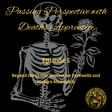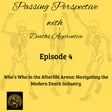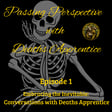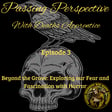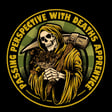Become a Creator today!Start creating today - Share your story with the world!
Start for free
00:00:00
00:00:01

Embracing Mortality: Navigating Fear, Planning, and the Unseen Truths of Death
Show Notes: Passing Perspective with Death’s Apprentice
Episode Theme:
This episode of “Passing Perspective with Death’s Apprentice” tackles the profound and often avoided subjects of death, dying, and grief. It underscores the importance of addressing these topics despite their potential to trigger discomfort.
Key Discussion Points:
Facing the Fear of Death:
The episode examines why many fear death and discusses psychological barriers that hinder open conversations about mortality. By confronting these fears, listeners can reduce the stigma around death and prepare themselves and their loved ones better.
Bridging the Gap Between Desires and Reality:
While many prefer to die at home, the reality is that most deaths occur in hospitals. Engaging in discussions about death, particularly with the elderly, can help align desires with reality.
Resources and Planning:
The host highlights the importance of using credible resources like podcasts, social media, and peer-reviewed articles to gain insights into death and dying. Consulting with professionals—medical, legal, and financial—is crucial for informed end-of-life decisions and estate planning. Funeral directors and death doulas are also invaluable in handling final wishes and after-death arrangements.
Practical Preparations:
Encourages listeners to discuss medical and end-of-life decisions with loved ones to prevent conflicts. Recommends creating a “death binder” containing essential documents and preferences to ease the burden on family members.
Cultural Exploration:
The episode touches on the concept of zombies, linking them metaphorically to fears about mortality. This sets the stage for a future exploration of the horror genre’s psychology, especially in relation to death and grief.
Engagement and Further Exploration:
Listeners are invited to imagine their own death scenarios to facilitate meaningful discussions. The host hints at an upcoming exploration of horror psychology, inviting further engagement through a website and social media channels.
Call to Action:
Confront your fears, plan for the inevitable, and engage in open conversations about death to help yourself and loved ones cope better with the reality of mortality.
Music from #Uppbeat
https://uppbeat.io/t/the-wayward-hearts/a-calm-hellfire
License code: TOEJOJDEKNY4JPIU
Transcript
Introduction and Disclaimer
00:00:06
Speaker
Thank you for listening to Passing Perspective with Death's Apprentice.
00:00:10
Speaker
Being that this is a podcast about death, dying and grief, some topics discussed may be triggering for some or not suitable for younger listeners, hence the explicit rating.
00:00:24
Speaker
Listener discretion is advised.
00:00:27
Speaker
Enjoy the show.
00:00:37
Speaker
Thank you.
The Significance of Discussing Death
00:00:45
Speaker
Welcome back to Passing Perspectives with your host, Death's Apprentice.
00:00:51
Speaker
And once again, thanks for listening.
00:00:54
Speaker
This week, I will be talking about death.
00:00:57
Speaker
No surprise there, right?
00:00:59
Speaker
But this week, it's all about talking about death and even planning for it.
00:01:05
Speaker
Tying these two things together seemed like a choice that makes sense.
00:01:11
Speaker
I figured this would be a great starting point for a podcast that talks about death.
00:01:17
Speaker
And if you have ended up here, you are at least interested in the topic.
Fears and Stigma Around Death
00:01:22
Speaker
I ended last week's episode with the question of why people fear death.
00:01:29
Speaker
The answer broke down into a few categories that could tell whether someone is more accepting of death and how they deal with it from a psychological aspect.
00:01:42
Speaker
These fears about death can also place restrictions on whether or not you talk about death.
00:01:50
Speaker
and whether or not you even make plans for your own eventual demise.
00:01:56
Speaker
The first step in anything is to identify what your feelings are surrounding it.
00:02:03
Speaker
What aspects of it are you afraid of?
00:02:06
Speaker
What things are holding you back?
00:02:09
Speaker
Maybe you just don't think about death because it doesn't affect you every day.
00:02:14
Speaker
Or you could just not want to face it because it means grieving losses that you maybe have not grieved yet.
00:02:23
Speaker
Or it could even be just putting a name to something you have felt.
00:02:28
Speaker
No matter your reasons, which are personal for everyone, the fact is that it will happen one day.
00:02:35
Speaker
It sucks.
00:02:37
Speaker
No one really wants to sit around and think about themselves or loved ones dying.
00:02:43
Speaker
But we are all humans and with that humanity comes an expiration date.
00:02:49
Speaker
I feel like my purpose here is to take away the stigma associated with death and maybe help you be more okay with that fact, not just for yourselves, but the loved ones you will leave behind.
00:03:02
Speaker
Thoughts and feelings are sometimes contagious and perhaps coming to grips with and planning for your own eventual demise, you can also help your loved ones to also accept it.
00:03:19
Speaker
One of my main takeaways from working with death on a daily basis is that with death and loss and grief, the opposite is life and living it.
00:03:29
Speaker
You can think about death and still enjoy every moment of the life you lead.
00:03:35
Speaker
These two things are definitely not mutually exclusive.
00:03:40
Speaker
I mean, if Persephone can be the goddess of spring and the underworld, so can all of us.
00:03:47
Speaker
On that note, get your notebooks ready and let's discuss talking about and planning for our end.
Imagining and Planning for Death
00:04:28
Speaker
Thinking about death and death plans.
00:04:31
Speaker
When we begin to think about death, before we ever start making our death plans, I think the very first step you should take is to imagine what your death looks like.
00:04:42
Speaker
I always joke that mine looks like me dying while trying to hug a bear or kiss a raccoon.
00:04:47
Speaker
It could end up being something else entirely, maybe sudden, maybe prolonged, or with a time limit.
00:04:54
Speaker
Either way it happens, what do I imagine it to look like at the end?
00:04:59
Speaker
Is it quick or drawn out?
00:05:01
Speaker
Am I gasping for my last breath, dying in my sleep peacefully, or is it sudden like a heart attack?
00:05:10
Speaker
Maybe painful, but all at once?
00:05:12
Speaker
How old am I?
00:05:14
Speaker
Am I young or old?
00:05:15
Speaker
What have I done with my life?
00:05:17
Speaker
Am I dying with regrets?
00:05:19
Speaker
What am I leaving to my loved ones?
00:05:22
Speaker
There are so many things to consider when you imagine this scenario.
00:05:26
Speaker
Now is the time to write it down.
The Reality of Death vs. Ideals
00:05:28
Speaker
Write down every detail you can imagine or even think of.
00:05:32
Speaker
Statistically speaking, with a little internet sleuthing and so many numbers and studies to report, the general trend amongst all the numbers is that, for most people, a quick, painless death at home,
00:05:46
Speaker
is ideal.
00:05:47
Speaker
Interestingly enough, even though the trend shows that most people want to die at home, the majority of deaths happen in the hospital.
00:05:56
Speaker
Where is the disconnect between what people want and what happens?
00:06:02
Speaker
Do you imagine dying in the hospital?
00:06:04
Speaker
I don't.
00:06:05
Speaker
When you imagine your death, is it quick and painless?
00:06:08
Speaker
You're not alone.
00:06:09
Speaker
Most people imagine it that way as well.
00:06:13
Speaker
Are your loved ones shocked or are they aware and taken care of?
00:06:16
Speaker
Have you accomplished everything you set out to do in your life?
00:06:20
Speaker
What about your bucket list?
00:06:21
Speaker
Are you satisfied?
00:06:23
Speaker
What does the end of your story say?
Researching Death Planning
00:06:26
Speaker
The next step of this process is to talk to others.
00:06:30
Speaker
Get some insight into what is out there and what others have planned.
00:06:35
Speaker
The elderly are probably a great place to start and I promise you they will love the conversation.
00:06:42
Speaker
But who better than people who are already thinking about their own death?
00:06:46
Speaker
Talk to your parents, your grandparents, neighbors, friends.
00:06:50
Speaker
Ask your friends about their experiences with loss and death.
00:06:54
Speaker
Ask them if they have thought about their own death plans.
00:06:58
Speaker
I promise it is not weird.
00:07:00
Speaker
Lots of people secretly think about this.
00:07:03
Speaker
After talking to others, start looking at other sources.
00:07:07
Speaker
I will list some sources in the show notes as suggestions.
00:07:11
Speaker
There are multiple sources to get information from.
00:07:14
Speaker
With the availability of the internet, the sources are nearly endless.
00:07:19
Speaker
If you are here listening to me, podcasts are on your list.
00:07:23
Speaker
There are a number of them that touch on different aspects of death and can be informative from death studies to psychology.
00:07:31
Speaker
And you shouldn't stop there.
00:07:33
Speaker
Social media, while not the most accurate sometimes, is also a good source for ideas.
00:07:39
Speaker
There are a ton of subreddits with many death topics, a Facebook group for everything, and Instagram.
00:07:47
Speaker
For a scientific view, you can find articles and studies with death as a focus in many areas.
00:07:53
Speaker
For the most accurate, look for peer-reviewed, less than two years old, and with larger sample sizes.
00:08:01
Speaker
If possible, also pay attention to the funding and affiliations of the study, which can lean towards a bias, even though it's
00:08:08
Speaker
It's not good to learn about death trends from someone who's profiting from it, right?
00:08:14
Speaker
Wikipedia is actually a great place to start with this because if you scroll down to the bottom of any page, there's a list of resources.
00:08:23
Speaker
You can check those out, then just continue down the rabbit hole.
00:08:28
Speaker
Thus begins your research into death, which should also include the local laws and regulations for your state and jurisdiction.
Consulting Professionals
00:08:37
Speaker
They can vary widely.
00:08:39
Speaker
There are no federal laws regulating the death industry.
00:08:42
Speaker
The key is a research, research, research.
00:08:47
Speaker
After you've done all of this research and have a good grasp of what is available and what death can look like and what's legal and all that, you should probably start speaking to professionals.
00:09:01
Speaker
Professionals in the death industry come in all shapes and sizes.
00:09:05
Speaker
I believe episode four is all about who is who in the death industry.
00:09:10
Speaker
So who do you talk to about death plans?
00:09:13
Speaker
Start with medical professionals, because in all honesty, that is where your death journey will begin.
00:09:19
Speaker
It will begin with a medical decision of some sort.
00:09:22
Speaker
What type of medical decision will have to be made by you and for you?
00:09:27
Speaker
Ask your doctor.
00:09:29
Speaker
What resources are there for a terminal diagnosis or at the last stages of life?
00:09:34
Speaker
These are all questions for medical professionals.
00:09:37
Speaker
You may want to speak to a lawyer, estate planner, financial planner, or an accountant.
00:09:43
Speaker
If you have any assets, children, stocks, bonds, retirement, anything at all that will need to be divided up or sent to probate, you will need to speak to at least one or more of these professionals.
00:09:54
Speaker
Lawyers and estate planners will generally help with your legal needs, whether it be your will, a trust, or what your options are as far as how assets are divided.
00:10:05
Speaker
Financial planners and accountants can help you more on the financial side with value, taxes, and what the ramifications are as far as dividing up and valuing assets.
00:10:17
Speaker
The last on my list is of professionals to speak with are the funeral directors, death doulas, death advocates, etc.
00:10:26
Speaker
These are the people who will help you plan your final wishes, sometimes even before you pass.
00:10:33
Speaker
A death doula can help with the passage of death, just as birth doulas assist with the passage of birth, and both advocate for you to have the natural birth or death you desire.
00:10:45
Speaker
Funeral directors are a great source for questions on what happens with your body after death.
00:10:50
Speaker
You may want to consult a different company based on your different needs, depending on if you want something special done, like
00:11:00
Speaker
body organ or tissue donation or having your body composted or your ashes turned into diamonds, they would be the best place to start.
00:11:10
Speaker
A death professional, like a funeral director, death doula, or death advocate can help you in navigating all of these options and figuring out ways to pay for them either upon death or before you pass.
00:11:24
Speaker
Keep in mind that almost all life insurance and pre-payment plans have clauses and stipulations like maturity dates, so pay very close attention to these.
00:11:37
Speaker
Now that you have all of this information, you should have a good picture of what you can and can't do and are really starting to come up with a plan.
Communicating with Loved Ones
00:11:48
Speaker
After planning, your next thing to do is to, you guessed it, talk about it.
00:11:54
Speaker
Are you starting to get the theme here?
00:11:56
Speaker
The next part is more talking.
00:11:59
Speaker
This time with your loved ones about your plans.
00:12:03
Speaker
This can be a tough conversation.
00:12:05
Speaker
As we have discussed already, there are lots of reasons people have a fear of death.
00:12:10
Speaker
And with going into the conversation about your plans, it is important to keep that in mind.
00:12:17
Speaker
It is best to prepare your loved one for the conversation.
00:12:21
Speaker
Don't just spring it on them.
00:12:23
Speaker
Let them know, hey,
00:12:25
Speaker
I have been working on my death plans and I would like to discuss them with you.
00:12:30
Speaker
Is there a time you may be available?
00:12:32
Speaker
How about Tuesday at 6?
00:12:34
Speaker
Make sure you are distraction-free and can spend the time talking about something that may be tough.
00:12:41
Speaker
Don't do it while your kids are running around asking you questions about homework or while you're making dinner and have four different things going on.
00:12:51
Speaker
Whether it is you or your spouse and your spouse or your parents or your siblings, whoever it is, make the quiet time.
00:13:00
Speaker
So how do you communicate?
00:13:02
Speaker
How do you do it effectively?
00:13:04
Speaker
There are lots of sources on how to communicate effectively.
00:13:08
Speaker
To touch on some of the effective communication tips and applying them to this conversation in particular, the main things are to allow space for both yourself and for those you are speaking with.
00:13:20
Speaker
Set clear boundaries and accept people for who they are and what they say.
00:13:24
Speaker
Sometimes people may not agree with your choices or may not be able to deal with you even thinking about death.
00:13:32
Speaker
They may have their own fears and anxieties about death.
00:13:35
Speaker
One of the best tips are to listen to hear and speak to be heard.
00:13:40
Speaker
Don't just think about the next thing you're going to say, but actually listen and hopefully your loved ones will do the same.
00:13:46
Speaker
There may be times when them or you may need to walk away from the conversation and come back to it.
00:13:54
Speaker
That is okay too.
00:13:56
Speaker
If emotions get too high, take a break and revisit it at another time.
00:14:01
Speaker
You may find during the course of the conversation that the people you wanted to make the decisions for you upon impairment or death may not be the best choice.
00:14:13
Speaker
You may find that your spouse or children may not be the best choice for your medical decisions, or your parents may not be the best choice for deciding for your funeral arrangements because of their religious views.
00:14:29
Speaker
and they're different than yours.
00:14:31
Speaker
This is why having these conversations is important.
00:14:36
Speaker
You should try to accept that others will have different views on death.
00:14:40
Speaker
You have now had some tough conversations and done some research.
00:14:46
Speaker
Now it is time to start making some plans.
00:14:49
Speaker
A lot of these plans I will go into depth on more in future episodes.
00:14:53
Speaker
For now, this is to help you start thinking about what you need to do.
Organizing Death Documents
00:14:58
Speaker
My advice is a death binder.
00:15:02
Speaker
I mentioned it in the last episode how I made one in the throes of depression and suicidal ideation.
00:15:09
Speaker
So what is a death binder?
00:15:12
Speaker
It is essentially the place your death plans are stored.
00:15:16
Speaker
The catch-all for all your paperwork, documents, thumb drives, pictures, basically all the things that you will need prior to and during or after your death.
00:15:27
Speaker
Things that you may not even be thinking about right now.
00:15:31
Speaker
It can be any kind of binder.
00:15:32
Speaker
No preference.
00:15:33
Speaker
You can use folders, files, sheet protectors, dividers.
00:15:37
Speaker
It can be as fancy or sloppy as you desire.
00:15:41
Speaker
It's yours.
00:15:42
Speaker
I feel like this is an important step both for your own journey and for your loved ones after you pass.
00:15:48
Speaker
You can organize your binder any way you want, but one of the first things I recommend is to start with what you have.
00:15:54
Speaker
Go through all the things you have, even if you don't think it is worth much.
00:15:59
Speaker
Biggest to smallest.
00:16:00
Speaker
Even the most innocuous figurine could mean a lot to one of your loved ones.
00:16:05
Speaker
I advise a spreadsheet.
00:16:07
Speaker
List the item, attach a picture.
00:16:09
Speaker
I love attaching documents to spreadsheets.
00:16:11
Speaker
It's so fun.
00:16:12
Speaker
Hyperlinks, man.
00:16:14
Speaker
List locations and value and what happens to it after you pass.
00:16:18
Speaker
If you have a person or charity in mind for it, make a call and mention it.
00:16:23
Speaker
For items with value, have it appraised.
00:16:25
Speaker
Speak to a financial manager regarding your retirement and insurance accounts.
00:16:31
Speaker
as well as a lawyer, especially if you are planning on leaving anything to a minor.
00:16:35
Speaker
A minor cannot claim assets until they are 18 years old without a court order.
00:16:41
Speaker
So consider using a trust for your minors as the beneficiary instead of making them a direct beneficiary.
00:16:48
Speaker
Because just anecdotal, every person I knew who inherited money at 18 did not use it wisely.
00:16:54
Speaker
These are definitely situations to consult a lawyer for as well as putting it in writing with a will once you decide who will get what assets when you pass and who will be in charge of your estate.
00:17:07
Speaker
I highly recommend assigning each and every asset right down to the smallest figurine.
00:17:13
Speaker
Nothing brings out the worst in people like death and money.
00:17:19
Speaker
The more you have spelled out, the less complicated it gets when you die.
00:17:24
Speaker
You'd be amazed the family feuds that have started over a salt and pepper shaker.
00:17:31
Speaker
You should already have the bulk of your death planning research done at this point, but there is other information that will be important to have handy when you pass.
00:17:41
Speaker
A big one is your social security number.
00:17:45
Speaker
So many times a family does not have this information.
00:17:49
Speaker
Also, if you're a veteran, a copy of your DD-214 is needed for any military honors or veterans benefits.
00:17:57
Speaker
Any copies of military and veterans papers are great, but you need that DD-214 for anything veteran related.
00:18:05
Speaker
You can request a copy of this form from the Veterans Administration.
00:18:09
Speaker
This also includes any other clubs or agencies you're in like the Shriners.
00:18:14
Speaker
You should have that listed out and who contacts are.
00:18:17
Speaker
You should have a listing of all social media accounts, bank credit accounts, credit cards, account numbers, and asset accounts, advisors, lawyers, accountants, insurance policies, and contacts, utilities, mortgage, and employment contacts.
00:18:33
Speaker
Important contact numbers for family and professionals, doctors, funeral home preference.
00:18:39
Speaker
Death plans, any and all legal documents, recent statements, asset inventory, the spreadsheet I mentioned, information on children, spouse, grandparents, parents, maiden names, information that will be needed for the death certificate, obituary, and dividing the estate.
00:18:59
Speaker
Collect it all in one place.
00:19:01
Speaker
Also, I advise pictures.
00:19:03
Speaker
You will need those for any kind of video remembrance.
00:19:07
Speaker
I highly advise a fire and blood proof safe.
00:19:10
Speaker
Give the extra key to your emergency contact or person you trust.
00:19:15
Speaker
You can store your pictures in there as well as any thumb drives with documents and pictures and you know they will be safe in an emergency.
00:19:23
Speaker
One of the most important aspects of making these plans and the death binder is to put everything in writing.
00:19:30
Speaker
This does require professionals, whether it is a will or trust, funeral and death plans, health care directives, etc.
00:19:38
Speaker
You will need to have this stuff generally in writing and notarized, sometimes even already through the court system.
00:19:46
Speaker
All of the official paperwork needs a few copies.
00:19:49
Speaker
Keep one in your death binder, one with your regular files, send one to your executor.
00:19:54
Speaker
Sometimes a funeral home and or a lawyer will also keep a file on hand.
00:20:00
Speaker
If you make any financial arrangements, keep those on hand as well.
00:20:04
Speaker
If you bought a cemetery plot or a niche, keep a copy of those papers in the binder so they'll be easy to locate.
00:20:11
Speaker
The last step is to talk about it again and let people know your plans and how to find all of your information.
00:20:20
Speaker
Remember that death plans are like dirty diapers and should be changed frequently because such as the world works.
00:20:27
Speaker
Nothing ever stays the same.
00:20:30
Speaker
The situation today may not be the same situation in 10 years or even a year from now.
00:20:36
Speaker
People die, people are born, and values and assets change.
00:20:40
Speaker
Change is a part of life.
00:20:42
Speaker
Laws even change.
00:20:44
Speaker
And I hope I've given you a good primer on talking and making these death plans.
Updating Death Plans
00:20:50
Speaker
And I will go into more detail on all of this a little bit at a time in future episodes.
00:20:56
Speaker
But I hope to get you thinking about your own death and maybe even starting to put together your own death binder and having these tough conversations.
00:21:06
Speaker
No time like the present, right?
00:21:41
Speaker
So for this week's question of the week, it's kind of switching gears.
A Lighthearted Zombie Discussion
00:21:45
Speaker
We went from talking about death and planning about death to could zombies ever become real?
00:21:54
Speaker
This question came from my child because of course my kids talk about death.
00:22:00
Speaker
This, I think, is not a question unique to just children, though.
00:22:05
Speaker
I think a lot of us ponder whether zombies could ever be real.
00:22:10
Speaker
We're obsessed with the genre.
00:22:12
Speaker
This is explored throughout the zombie horror genre with a wide variety of causes for a zombie outbreak, from mushrooms to chemicals to manipulated genes.
00:22:24
Speaker
In each different movie or show or story, they are created differently and act differently.
00:22:30
Speaker
There are the smart zombies, dumb zombies, zombies with rage, zombies that can swim, zombies that can't, zombies that continue doing patterns they were doing while alive, and zombies that have a main drive to eat brains.
00:22:47
Speaker
Even the special zombies that came from voodoo rituals.
00:22:51
Speaker
No matter what differences between how they were formed and what type of zombie they are, the main attraction is because we wonder what we would do in that situation.
00:23:03
Speaker
How would you react when you had to deal with your wife as a zombie or your child?
00:23:08
Speaker
We fear zombies, apparent by how expansive the genre is.
00:23:14
Speaker
So can it ever be real?
00:23:16
Speaker
My answer is, of course, not scientific, but I honestly think you never know.
00:23:23
Speaker
The Last of Us introduced mushrooms that turn people into zombies, and with that, I don't feel it is too far-fetched.
00:23:30
Speaker
There are mushrooms that do make ants zombies, but I suppose a lot of the other causes are also based on situations that could seem plausible.
00:23:39
Speaker
Chemicals that cause you to not have control?
00:23:42
Speaker
That definitely feels like a zombie!
00:23:45
Speaker
Maybe the real answer is that we are all already zombies, and that is why we are obsessed with them.
00:23:53
Speaker
We already see ourselves as that.
00:23:55
Speaker
But scientifically, here's what I found.
00:23:59
Speaker
Quick internet search, and this is by no means an academic paper or any kind of solid proof.
00:24:05
Speaker
But from everything I found, it says that zombies would never happen, and gave lots of reasons why.
00:24:12
Speaker
The mushrooms can't survive our body temperature.
00:24:15
Speaker
Not sure I believe that one.
00:24:16
Speaker
It could just be a now thing, especially with temperatures rising and life adapting to it.
00:24:22
Speaker
And as I said, already some chemicals and medicines already make you zombie-like.
00:24:27
Speaker
Grain death, anyone?
00:24:28
Speaker
Ever tried to stay awake after taking NyQuil or Benadryl?
00:24:32
Speaker
Some medicine for mental illness can feel that way as well.
00:24:35
Speaker
I have heard people use zombie-like as a term to describe how they feel on antidepressants.
00:24:41
Speaker
antipsychotics, bipolar meds, and ADHD meds.
00:24:46
Speaker
I've seen drug users who definitely resembled zombies.
00:24:50
Speaker
Maybe we don't have an answer to this because we don't have a clear definition of what a zombie is or
00:24:57
Speaker
what constitutes one.
00:24:59
Speaker
So could zombies ever become real?
00:25:03
Speaker
Maybe.
00:25:04
Speaker
Because maybe they already exist.
00:25:08
Speaker
Join me next week when we go mourn to death into the psychology of the horror genre and how it relates to our feelings about death, dying, and grief.
Reflections and Closing Thoughts
00:25:18
Speaker
For this week's quote, it's by the great Andy Warhol.
00:25:22
Speaker
Dying is the most embarrassing thing that can ever happen to you because someone's got to take care of all your details.
00:25:32
Speaker
Love him.
00:25:33
Speaker
Love him.
00:25:34
Speaker
There's a good documentary about him on Netflix recently.
00:25:37
Speaker
You should watch it.
00:25:37
Speaker
Fantastic.
00:25:38
Speaker
Fantastic.
00:26:11
Speaker
Thank you for listening to this episode of Passing Perspective.
00:26:15
Speaker
It brings me joy to talk to you about death and guide you on your way to making informed decisions about your own death and that of your loved ones.
00:26:24
Speaker
I hope you are thinking about the next steps you are going to take and where to begin with your
00:26:30
Speaker
own death plans and having those hard conversations with your loved ones about theirs and I would love to hear your feedback on the process and if there is anything important I didn't mention if you have any comments
00:26:46
Speaker
questions, stories, or just want to say hi, please check out the website www.passingperspective.com where you can find links to places to listen and social media, learn about Death's Apprentice, find show notes, or even interact.
00:27:06
Speaker
You can also find me on social media, on Facebook at Passing Perspectives and Instagram at Passing Perspective Podcast.
00:27:16
Speaker
Until next time, Dust Apprentice out!
00:27:30
Speaker
Thank you for listening to this episode of Passing Perspective with Des Apprentice.
00:27:36
Speaker
All episodes are written, hosted, and produced by Des Apprentice.
00:27:41
Speaker
Music is a calm hellfire by The Wayward Hearts.
00:27:46
Speaker
Licensing by Upbeat.
00:27:49
Speaker
Tune in for next week.
00:27:51
Speaker
See you then.
00:28:45
Speaker
you
